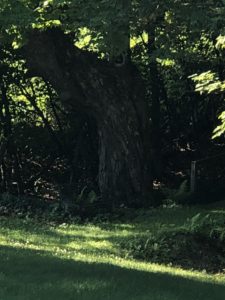Take your yoga mat outside and sample the benefits of a practice limited only by your personal curiosity, creativity and awareness.
When several clients asked for a yoga practice in the garden, I needed to do a little research. What I learned began with the fruits of that research but developed by experience. One thing I know for sure is this – please, if at all possible, practice outdoors – grass, deck, dock, park, beach or woods – take it outdoors!
SPACE: Create a safe space. For added comfort or stability, you might want to use 2 mats. Practice early in the day if heat or humidity is a concern and, as always, protect your skin from harmful UV rays. Hydrate frequently as both sun and air may increase fluid needs. Know your tolerance for insects and possible poisonous plants. Know your neighborhood. Be savvy and secure.
MEDITATION: Some believe it easier to meditate in the outdoors. Clear air helps to clear the mind or to acknowledge thoughts with clarity. There is simplicity and sweetness in being.
SENSUALITY : Both stillness and movement are deepened by enhanced senses of sight, hearing, touch and smell. Changes in air quality over the time spent in practice are palpable; air movement touches the skin as a reminder that the world is always in motion. Bird song accompanies asana and provides easy focus for meditation. (Depending on where you practice you might hear city sounds or water rolling, crashing or babbling.) While plants, soil and trees exude smells of their own, the very scent of freshness is real. Practice yoga, practice meditation, practice balance, practice awareness.
: Both stillness and movement are deepened by enhanced senses of sight, hearing, touch and smell. Changes in air quality over the time spent in practice are palpable; air movement touches the skin as a reminder that the world is always in motion. Bird song accompanies asana and provides easy focus for meditation. (Depending on where you practice you might hear city sounds or water rolling, crashing or babbling.) While plants, soil and trees exude smells of their own, the very scent of freshness is real. Practice yoga, practice meditation, practice balance, practice awareness.
BENEFITS: Practice becomes more expansive as you breathe deeply, reach upwards and outwards in inexhaustible space. Connection with the earth encourages groundedness, stability, security, and a sense that you are a piece of a larger whole.
ASANAS: What fun it is to explore the many yoga poses that connect with nature. For starters try Rabbit, Deer, Bear, Lizard, Eagle, Mountain, Tree, Lotus …
Practicing outdoors stimulates a sense of gratitude for what is. “Grant me daily the grace of gratitude, to be thankful for all my many gifts, and so be freed from artificial needs, that I might lead a joyful simple life.” (Edward Hays)
